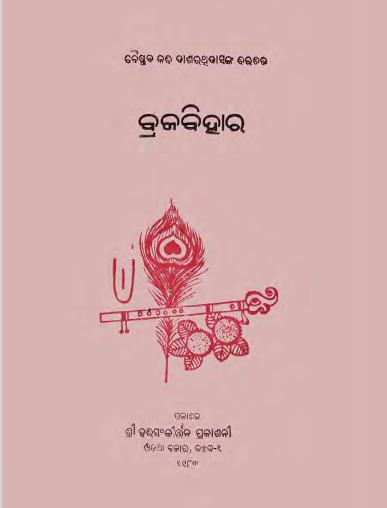Dasharathi Das, a prominent figure in Odia literature, published his renowned poetry collection Brajabihara in 1909. This work represents a significant contribution to the realm of Odia poetry, capturing the essence of the cultural and emotional landscape of Odisha during that era. Brajabihara, with its evocative verses and rich imagery, not only showcases Das’s poetic prowess but also reflects the social and spiritual ethos of the time.
The title Brajabihara translates to the pastimes in Braja (the region associated with Lord Krishna), and through it, Das intricately weaves themes of love, devotion, and the beauty of nature, creating a tapestry that is deeply rooted in the cultural and spiritual traditions of Odisha. The collection is marked by a lyrical quality that brings forth an immersive experience for readers, inviting them to explore the enchanting world of Krishna and his beloved Radha.
In Brajabihara, sub-poetry serves as a powerful vehicle for Das to express complex emotions related to love and devotion. Each poem is a glimpse into the heart of the poet, revealing his deep connection to the divine and the natural world. The imagery of Braja, where the divine pastimes of Krishna unfold, becomes a metaphor for the inner journey of the soul seeking union with the divine.
One poignant sub-poem highlights the enchanting beauty of nature as an expression of divine love. Das often uses vivid descriptions of lush landscapes, blooming flowers, and serene rivers to symbolize the richness of human emotions. For instance, in his poem, he might describe the melodic whispers of the wind as Krishna calling out to his beloved Radha, creating a world where nature and spirituality are intricately entwined.
Das’s exploration of love transcends mere romantic themes. He delves into bhakti (devotion) and the emotional turmoil that comes with longing for the divine. His portrayals of Radha’s love for Krishna mirror the soul’s pursuit of spiritual fulfillment. The tension between earthly desires and divine aspirations is a recurring motif, capturing the essence of human experience in its most profound form.
The rhythmic flow of Das’s verses enhances the thematic elements of his poetry. His mastery of language and wordplay invites readers to revel in the musicality of Odia, enriching the overall experience. The repetition of certain phrases and the use of metaphors create an enchanting rhythm that draws readers into the emotional depth of each poem.
Moreover, Brajabihara stands out for its ability to bridge the past and present. While it harks back to the timeless tales of Krishna and Radha, Das’s interpretation resonates with contemporary readers, reminding them of the enduring nature of love and devotion. His ability to evoke powerful emotions through simple yet profound language allows for a deep connection across generations.
Books Info
| Books name | Brajabihara Part-2 / ବ୍ରଜବିହାର |
| Author | Dasharathi Das |
| No Of pages | 192 |
| Publisher | Sri Harisankirtana Prakashani |
| Publication | 1909 |
| Printed At | NA |
| Distributor | NA |

